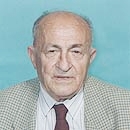 |
|
Dragoslav Avramovic, born in 1919, was the World Bank's chief economist for Latin America and the Caribbean and director of the development economics department, deeply concerned with the debt burden of developing countries. After remaining with the bank from 1953 to 1978, he entered politics and became one of the staunchest opponents of Slobodan Milosevic, whom he once described as a "brutal feudal overlord", and on the eve of the September 2000 elections in Yugolslavia, Avramovic was seen as one of only two people in the country capable of defeating Milosevic in a free vote. The other was Vojislav Kostunica, who eventually became president. |
Earlier in 1996, he had given up leadership of the coalition of opposition parties known as Zajedno (Together), citing his poor health and age. The common denominator of the Zajedno movement was the very specific goal of removing Milosevic and his party from their powerful position in Yugoslavian politics. Beyond that, Zajedno shared a commitment to moving the country away from the single-party way of thinking that was part of the Communist system, toward a multi-party participatory democracy.
In 1972, together with other World Bank colleagues, Avramovic published a 529-page book, Economic Growth of Colombia, which dealt with the problems and prospects of the country. In 1983, Avramovic published another report, South-South Financial Cooperation, which focused on Jamaica and approaches to the country's economic crisis and feasibility issues.
Dragoslav Avramovic was also the governor of the National Bank of Yugoslavia between the crucial years of 1994 to 1996, and is credited with leading Yugoslavia out of hyperinflation with the creation of the new dinar in 1994. He was later removed from the governorship of the National Bank by Slobodan Milosevic. Besides being active in the Forum for International Relations, an NGO with the European Movement in Serbia, in 1999 he was head of an interim government named the Alliance for Change, which, as the opposition to Milosevic, urged the president of Yugoslavia and his close ally Serbian President Milan Milutinovic to step down.
Many people agree that Dr. Dragoslav Avramovic was far ahead of his colleagues in realizing the problem of the debt burden in developing countries. His legacy will live on in Latin America and the Caribbean, where he worked passionately for debt reform, as well as in his native Yugoslavia, where he is revered for his enlightened economic and political reforms. In early 2001, Avramovic passed away at the age of 81. |

